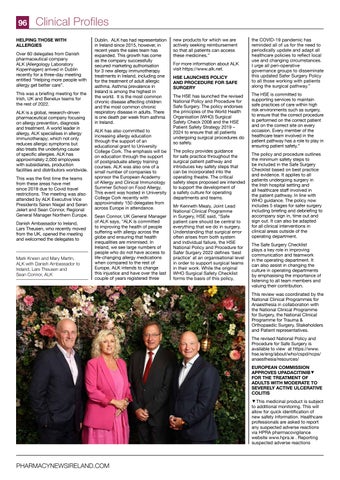96
Clinical Profiles
HELPING THOSE WITH ALLERGIES Over 60 delegates from Danish pharmaceutical company ALK (Allergology Laboratory Kopenhagen) arrived in Dublin recently for a three-day meeting entitled “Helping more people with allergy get better care”. This was a briefing meeting for the Irish, UK and Benelux teams for the rest of 2022. ALK is a global, research-driven pharmaceutical company focusing on allergy prevention, diagnosis and treatment. A world leader in allergy, ALK specialises in allergy immunotherapy; which not only reduces allergic symptoms but also treats the underlying cause of specific allergies. ALK has approximately 2,000 employees with subsidiaries, production facilities and distributors worldwide. This was the first time the teams from these areas have met since 2019 due to Covid travel restrictions. The meeting was also attended by ALK Executive Vice Presidents Søren Niegel and Søren Jelert and Sean Connor, Regional General Manager Northern Europe. Danish Ambassador to Ireland, Lars Theusen, who recently moved from the UK, opened the meeting and welcomed the delegates to
Mark Kneen and Mary Martin, ALK with Danish Ambassador to Ireland, Lars Theusen and Sean Connor, ALK
Dublin. ALK has had representation in Ireland since 2015, however, in recent years the sales team has expanded. This growth has come as the company successfully secured marketing authorisation for 3 new allergy immunotherapy treatments in Ireland, including one for the treatment of adult allergic asthma. Asthma prevalence in Ireland is among the highest in the world. It is the most common chronic disease affecting children and the most common chronic respiratory disease in adults. There is one death per week from asthma in Ireland. ALK has also committed to increasing allergy education through the support of an educational grant to University College Cork. The emphasis will be on education through the support of postgraduate allergy training courses. ALK was also one of a small number of companies to sponsor the European Academy of Allergy and Clinical Immunology Summer School on Food Allergy. This event was hosted in University College Cork recently with approximately 150 delegates from across Europe in attendance. Sean Connor, UK General Manager of ALK says, “ALK is committed to improving the health of people suffering with allergy across the globe and ensuring that health inequalities are minimised. In Ireland, we see large numbers of people who do not have access to life-changing allergy medications when compared to the rest of Europe. ALK intends to change this injustice and have over the last couple of years registered three
new products for which we are actively seeking reimbursement so that all patients can access these medicines.” For more information about ALK visit https://www.alk.net. HSE LAUNCHES POLICY AND PROCEDURE FOR SAFE SURGERY The HSE has launched the revised National Policy and Procedure for Safe Surgery. The policy endorses the principles of the World Health Organisation (WHO) Surgical Safety Check 2008 and the HSE Patient Safety Strategy 2019 – 2024 to ensure that all patients undergoing surgical procedures do so safely. The policy provides guidance for safe practice throughout the surgical patient pathway and introduces key safety steps that can be incorporated into the operating theatre. The critical safety steps proposed are intended to support the development of a safety culture for operating departments and teams. Mr Kenneth Mealy, Joint Lead National Clinical Programme in Surgery, HSE said, “Safe patient care should be central to everything that we do in surgery. Understanding that surgical error often arises from both system and individual failure, the HSE National Policy and Procedure for Safer Surgery 2022 defines ‘best practice’ at an organisational level in order to support surgical teams in their work. While the original WHO Surgical Safety Checklist forms the basis of this policy,
the COVID-19 pandemic has reminded all of us for the need to periodically update and adapt all healthcare policies to reflect local use and changing circumstances. I urge all peri-operative governance groups to disseminate this updated Safer Surgery Policy to all those working with patients along the surgical pathway.” The HSE is committed to supporting services to maintain safe practices of care within high risk environments such as surgery, to ensure that the correct procedure is performed on the correct patient and on the correct site on every occasion. Every member of the healthcare team involved in the patient pathway has a role to play in ensuring patient safety.” The policy and procedure outlines the minimum safety steps to be included in the Safe Surgery Checklist based on best practice and evidence. It applies to all patients undergoing surgery in the Irish hospital setting and all healthcare staff involved in the patient pathway. In line with WHO guidance. The policy now includes 5 stages for safer surgery including briefing and debriefing to accompany sign in, time out and sign out. It can also be adapted for all clinical interventions in clinical areas outside of the operating department. The Safe Surgery Checklist plays a key role in improving communication and teamwork in the operating department. It can also assist in changing the culture in operating departments by emphasising the importance of listening to all team members and valuing their contribution. This review was coordinated by the National Clinical Programmes for Anaesthesia in collaboration with the National Clinical Programme for Surgery, the National Clinical Programme for Trauma & Orthopaedic Surgery, Stakeholders and Patient representatives. The revised National Policy and Procedure for Safe Surgery is available to view at https://www. hse.ie/eng/about/who/cspd/ncps/ anaesthesia/resources/ EUROPEAN COMMISSION APPROVES UPADACITINIB FOR THE TREATMENT OF ADULTS WITH MODERATE TO SEVERELY ACTIVE ULCERATIVE COLITIS
This medicinal product is subject to additional monitoring. This will allow for quick identification of new safety information. Healthcare professionals are asked to report any suspected adverse reactions via HPRA pharmacovigilance website www.hpra.ie . Reporting suspected adverse reactions
PHARMACYNEWSIRELAND.COM


































